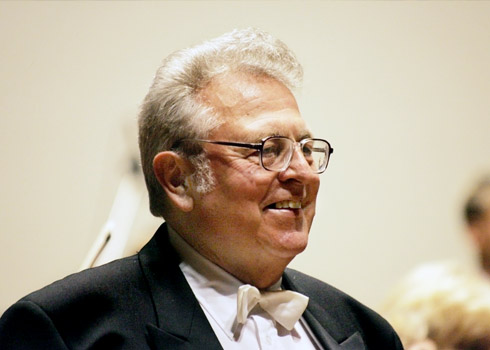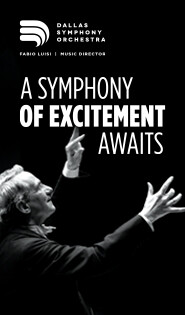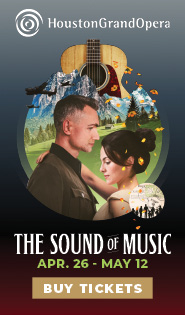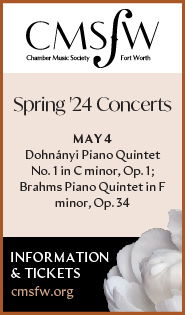Texas Music Festival offers power, if not always precision, in Brahms, Tchaikovsky

Horst Förster conducted the Texas Music Festival Orchestra Saturday night.
The Texas Music Festival dubbed Saturday’s orchestral program “Heroic Statements”–which may seem an unlikely title for a concert ending with Peter Ilyich Tchaikovsky’s Symphony No. 6.
Tchiakovsky’s final work, the Pathétique has long and widely been considered a self-portrait of the chronically tortured, depressive composer.
Festival conductor Horst Förster, longtime director of the Leipzig Academic Orchestra, evidently saw things differently. When the Pathétique concluded the concert in the University of Houston’s Moores Opera House, Förster never let it lapse into complete moroseness.
Instead, he and the Festival Orchestra seized on the music’s passion, storminess and ardor. And the Pathétique’s third-movement march supplied the heroism that the concert’s title had invoked.
Förster didn’t take the stately approach that some conductors think the march needs. Instead, the first flurries of action–even though they weren’t razor-sharp–raced forward, creating an air of eagerness and excitement. The march theme entered at a brisk, striding pace, and the musicians gave it increasing heft. The coda rang out in the compact Moores hall with heaven-storming impact.
All that made sense in the context of the rest of the symphony. Julianne Mulvey’s rich-voiced bassoon solo suggested the expressive power to come amid the shadows of the opening passage. When the first movement took off, the fast momentum ratcheted up the intensity, even though the orchestra was at times a bit unfocused.
The violins began their famous melody with a silkiness that filled it with tenderness. Then the melody surged and swelled as Förster and company let the music’s emotions emerge. An orchestral explosion unleashed the Pathétique’s first storm: The group’s playing wasn’t always precise, but the music’s ferocity came through, and the climax delivered the symphony’s first dose of visceral sonic impact.
The second movement’s Waltz didn’t glide along as airily as it sometimes does; balance was off, with background parts tending to stick out. But the orchestra, particularly the winds, gave the melody a full-throatedness that tied in with the vein of big emotions running through the whole symphony.
After the march’s heroics, Förster plunged into the finale almost immediately. That still left enough time for a few people to start clapping, but the quick and forceful start to the lament made a potent juxtaposition–perhaps like the hero of a Shakespearean tragedy suddenly foreseeing his downfall.
Förster and the orchestra never let the finale seem too woebegone. Instead, they gave its lyricism fullness and power. Even though the strings and brasses were out of sync when the stately second theme began, everyone eventually came together, and the melody ultimately pressed ahead to a fiery climax. When the music finally died out, it did so with dignity.
Johannes Brahms’ Piano Concerto No. 2, which comprised the concert’s first half, received a similarly powerful performance.
Anna Gilpatrick’s horn solo introduced the opening theme sturdily, and pianist Timothy Hester–of the University of Houston faculty–gave breadth and resonance to the keyboard’s replies. After the piano’s first outburst set the first movement in motion, the performers put the emphasis on spaciousness and grand musical gestures.
Hester and the orchestra alike brought the concerto a rugged power. There were stray missed notes among the piano part’s fistfuls of chords and keyboard-spanning flourishes, and the orchestra, likewise, brought Brahms’s weighty textures more wallop than clarity. But the first two movements’ drama still registered.
The slow movement’s cello solos, played by Marcella Kolacki, sounded a bit tentative. Hester brought richness and depth to the piano’s meditations, before losing his way for a few moments near the movement’s close. The finale wasn’t the breezy conclusion it should be, but Hester, Förster and the orchestra took it to a vigorous finish.
Members of the Texas Music Festival faculty will play chamber works by Carlos Salzedo, Franz Waxman, Shulamit Ran, Camille Saint-Saens and Richard Strauss 7:30 p.m. Tuesday in the University Houston’s Dudley Recital Hall.
Conductor Carlos Spierer will lead the Festival Orchestra in works by Joaquin Turina, Leonard Bernstein, Arturo Marquez and others 8 p.m. Friday in the Cynthia Woods Mitchell Pavilion in The Woodlands and 7:30 p.m. Saturday in the University’s Moores Opera House. 713-743-3388; www.tmf.uh.edu


